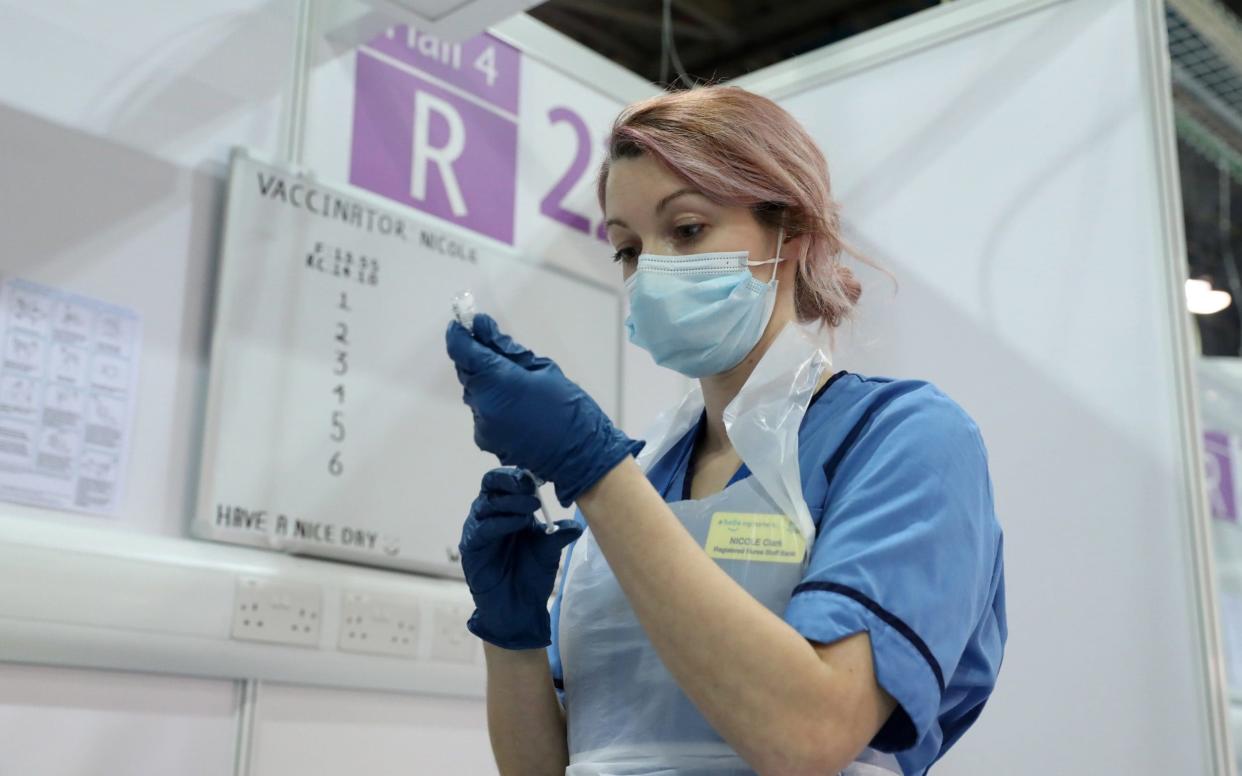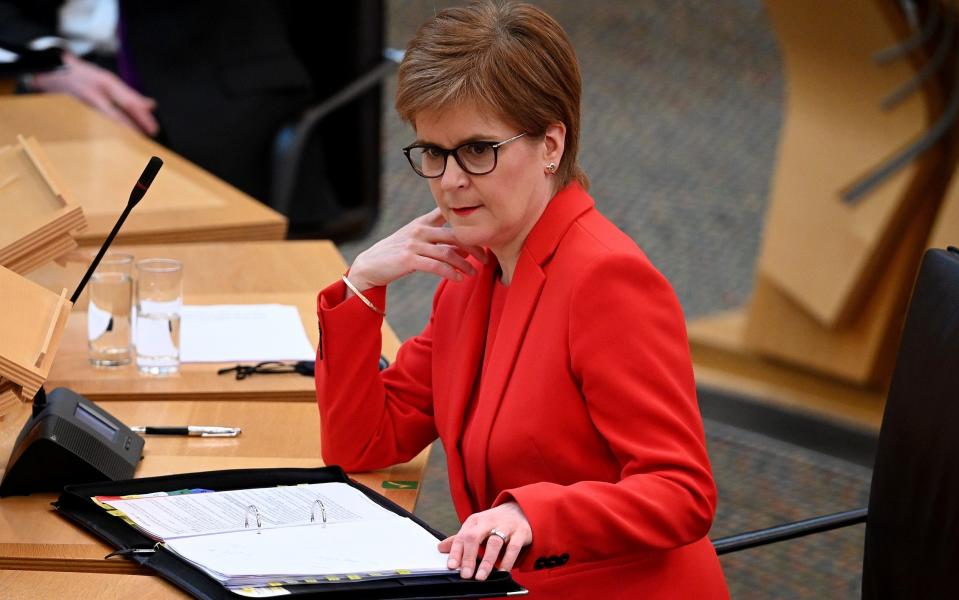Vaccine data shows Nicola Sturgeon should consider speeding up lockdown exit, says her Covid advisor

- Oops!Something went wrong.Please try again later.
Nicola Sturgeon should examine speeding up her new plan for unlocking Scotland amid encouraging evidence the vaccination programme is already starting to cut deaths, one of her handpicked Covid advisors has said.
Mark Woolhouse, professor of infectious disease epidemiology at the University of Edinburgh, said "the numbers are looking really good" on the Oxford and Pfizer vaccines preventing death and serious illness and keeping people out of hospital.
Prof Woolhouse, who sits on the Scottish Government's Covid-19 advisory group, told a Commons select committee: "My conclusion from that is if you're driven by the data and not by dates, right now, you should be looking at earlier unlocking."
Although he was not advocating a complete unlocking now, he later told the Telegraph the "whole sequence" in which Ms Sturgeon is planning to ease restrictions could be accelerated to take account of the "very positive" vaccine data.
Prof Woolhouse told MPs children under 16 could return to classrooms in the "reasonably near future" without triggering a large increase in the R number, the average number of people infected by each virus carrier.
He also warned that the "value of a lockdown goes down with time", with half the public health benefit of a six-month lockdown being felt in the first fortnight.
Prof Woolhouse's intervention came less than 24 hours after Ms Sturgeon said her blueprint for easing lockdown in Scotland, being unveiled next week, will be "driven much more by data than by dates."
"If you are driven by the data and not by dates, right now you should be looking at earlier unlocking because the data are so good," Prof Mark Woolhouse tells Science & Tech Select Committee
— sarahknapton (@sarahknapton) February 17, 2021
The First Minister said she wanted to start with reopening schools, then allow greater family contact then reboot the economy, and particularly non-essential retail.
However, she signalled the lifting of restrictions will be extremely slow and "even more cautious than it was last summer", with the current 'stay at home' lockdown continuing until at least the start of next month.
She warned Scots not to book Easter holidays as it "highly unlikely" that hotels or self catering accommodation will be open and even refused to guarantee that summer 'staycations' in Scotland will go ahead.
But Prof Woolhouse hit out at the "outcry" last summer over media coverage of crowded beaches, saying there had "never been a Covid-19 outbreak linked to a beach ever anywhere in the world to the best of my knowledge."
Both he and Ms Sturgeon said the uptake of the vaccines had been far higher than expected as she hailed "the first hard evidence" that the roll-out is cutting deaths among the most vulnerable.
The National Records of Scotland (NRS) report found that in the three weeks to last Sunday the number of Covid deaths in care homes fell by 62 per cent to a level last seen at the end of October.
Deaths among Scots aged over 85 - another early priority group in the roll-out - plummeted by 45 per cent and there are now fewer deaths in this age group than among those aged between 75 and 84, some of whom would have received their vaccine later.
Overall, there were 323 Covid-related deaths registered last week, a drop of 54 on the previous week and the third weekly decline in a row.
Over 80% of deaths from 8-14 Feb occurred in hospital representing 266 deaths, 42 deaths occurred in care homes &15 at home or non-institutional settings.Deaths in care homes over the last 3 weeks have fallen at a faster rate than deaths in other locations https://t.co/Ku0qgjLAn2 pic.twitter.com/Nc0GCpnIIC
— NatRecordsScot (@NatRecordsScot) February 17, 2021
Speaking at First Minister's Questions, Ms Sturgeon said care homes now accounted for a smaller proportion of overall Covid deaths than at any time since the pandemic started in March last year.
Referring to the sharp drop in deaths among the over-85s, she added: "It is reasonable to take some heart from that, because it strongly suggests that the vaccination programme is having the hoped-for effect of reducing the death toll from the virus."
Prof Woolhouse appeared to back Ms Sturgeon's decision not to include a firm timetable for easing lockdown in next week's blueprint, saying "we don't want to be overly focused on dates."
The academic, who is also a member of the UK Government's Scientific Pandemic Influence Group on Modelling, told the Commons science and technology committee: "We want to be focused on data. But the point I'd make about that is the data are going really well.
"The vaccination rollout is, I think, exceeding most people's expectations, it's going very well."
Arguing that the data currently points to an earlier unlocking, he added: "The transmission blocking potential is key.
"But so, of course, is its actual ability to protect against death and disease, and to keep people out of hospital, and those numbers are looking really good."
Describing a phenomenon called "exponential decay", under which the benefit of lockdown declines over time, he said: "You get half the public health benefit of that six-month lockdown in the first two weeks.
"The next two weeks is only half the benefit again and then half the benefit again. So, the actual public health benefit you're getting from lockdown diminishes over time if the R number is constant."
Young children in pre-school and the first three years of primary school will return to classrooms this Monday but Ms Sturgeon announced this week the vast majority of older pupils will remain home until at least March 15.

Prof Woolhouse told the committee: "There is a case, certainly for children under 16 up to 15, that having them in school does not make such a big contribution to the R number that we couldn't consider lifting it in the reasonably near future."
The academic added: "One of the stated reasons for keeping schools closed was to avoid some surge in cases when they open - that's never happened across western Europe."
Arguing that reopening schools and lifting restrictions on outdoor activities could have happened much sooner during the first lockdown, he added: "There's been very, very little evidence that any transmission outdoors is happening in the UK."
But a Scottish Government spokesman said: "We know from previous experience just how easily the virus can run away from us again when there is already a high baseline of transmission within the community.
“That is why we will continue to take a cautious approach, prioritising education, followed by greater family contact and the phased reopening of the economy, and a new strategic framework will be published before the next review date setting out the steps to achieve this.”

